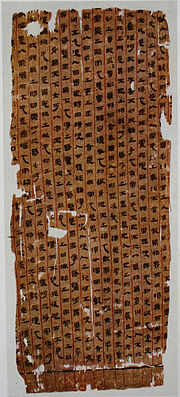
Back ዳው ዴ ጂንግ Amharic ताओ-ते-चिंग ANP داوديجنغ Arabic টাও টে চিং Assamese Dao de tszin Azerbaijani Даа Дэ Цзін Byelorussian Дао Дъ Дзин Bulgarian Tao Te Ching BS Daodejing Catalan Tao Te ťing Czech
 Ink on silk manuscript of the Tao Te Ching, 2nd century BC, unearthed from Mawangdui | |
| Author | Laozi (trad.) |
|---|---|
| Original title | 道德經 |
| Country | China |
| Language | Classical Chinese |
| Genre | Philosophy |
Publication date | 4th century BC |
Published in English | 1868 |
Original text | 道德經 at Chinese Wikisource |
| Translation | Tao Te Ching at Wikisource |
| Other names | |||||||||||||||||||||||||||||||||||||||
|---|---|---|---|---|---|---|---|---|---|---|---|---|---|---|---|---|---|---|---|---|---|---|---|---|---|---|---|---|---|---|---|---|---|---|---|---|---|---|---|
| Laozi | |||||||||||||||||||||||||||||||||||||||
| Chinese | 老子 | ||||||||||||||||||||||||||||||||||||||
| Wade–Giles | Lao3 Tzŭ3 | ||||||||||||||||||||||||||||||||||||||
| Hanyu Pinyin | Lǎozǐ | ||||||||||||||||||||||||||||||||||||||
| Literal meaning | "Old Master" | ||||||||||||||||||||||||||||||||||||||
| |||||||||||||||||||||||||||||||||||||||
| 5000-Character Classic | |||||||||||||||||||||||||||||||||||||||
| Chinese | 五千文 | ||||||||||||||||||||||||||||||||||||||
| Wade–Giles | Wu3 Ch'ien1 Wên2 | ||||||||||||||||||||||||||||||||||||||
| Hanyu Pinyin | Wǔqiān Wén | ||||||||||||||||||||||||||||||||||||||
| Literal meaning | "The 5000 Characters" | ||||||||||||||||||||||||||||||||||||||
| |||||||||||||||||||||||||||||||||||||||
| Part of a series on |
| Taoism |
|---|
 |
The Tao Te Ching[note 1] (traditional Chinese: 道德經; simplified Chinese: 道德经) is a Chinese classic text and foundational work of Taoism traditionally credited to the sage Laozi,[7][8] though the text's authorship, date of composition and date of compilation are debated.[9] The oldest excavated portion dates to the late 4th century BC,[10] but modern scholarship dates other parts of the text as having been at least compiled later than the earliest portions of the Zhuangzi,[citation needed] the other foundational text of Taoism.
The Tao Te Ching is central to both philosophical and religious conceptions of Taoism, and has had great influence beyond Taoism as such on Chinese philosophy and religious practice throughout history. Terminology originating in the Tao Te Ching has been reinterpreted and elaborated upon by Legalist thinkers, Confucianists, and particularly Chinese Buddhists, which had been introduced to China significantly after the initial solidification of Taoist thought. Artists including painters, calligraphers, and gardeners have found inspiration within the work,[citation needed] and it is comparatively well known in the West. It is one of the most translated texts in world literature.[10]
- ^ "Tao-te-Ching", Lexico UK English Dictionary, Oxford University Press, archived from the original on 29 July 2020
- ^ "Tao Te Ching". Dictionary.com Unabridged (Online). n.d. Retrieved 23 June 2020.
- ^ Julien (1842), p. ii.
- ^ Chalmers (1868), p. v.
- ^ Legge & al. (1891).
- ^ Suzuki & al. (1913).
- ^ Ellwood, Robert S. (2008), "Lao-tzu (Laozi)", The Encyclopedia of World Religions, Infobase, p. 262, ISBN 978-1-4381-1038-7
- ^ "The Tao Te Ching by Laozi: ancient wisdom for modern times", the Guardian, 27 December 2013, retrieved 28 January 2022
- ^ Eliade (1984), p. 26
- ^ a b Chan (2013).
Cite error: There are <ref group=note> tags on this page, but the references will not show without a {{reflist|group=note}} template (see the help page).
© MMXXIII Rich X Search. We shall prevail. All rights reserved. Rich X Search